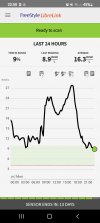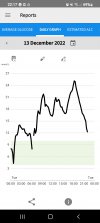Hi everyone,
I was diagnosed with T1 last week. My HbA1c was always ~35 and normal during my pregnancy so when it was 49 a year after giving birth (routine test) I was quite shocked. A GP diagnosed me with T2 and advised me to lose weight and I went onto the low calorie diet programme of soups and shakes. Lost 15kg in 12 weeks, hurrah! I asked for my HbA1c to be repeated at that point and to my surprise it had gone up to 97, strange because with the weight loss I expected it to improve. Anyway BG levels were (and still are!) out of control, I was put on metformin and increased up to 1.5g daily over a few weeks but no improvement in BG levels, didn't think much of it and neither did GP, was advised another drug would be added if on max dose and no response in a few more weeks. The GP then noticed that my lipase level was raised and said that actually he's not convinced that I have typical type 2 diabetes and thinks I instead have a subtype of type 2. I of course googled and couldn't find much info. Anyway he proceeded to get advice from a diabetes specialist who wanted to see me at the hospital immediately so off I went. I was told that given my history, which includes autoimmune hypothyroidism, and the severity of my symptoms that I was most likely T1. My BG was sitting at ~25 but no ketones thankfully. I was given lots of info and went home with a new kit and insulin (lantus 12 units in the evening and novorapid 3 units 15 mins before meal containing carbs). I had the GAD blood test to confirm but it will be a few weeks until the results are in. I ordered a sensor and am using that to monitor my BG levels, I did fingerprick for a few days. There was no change to my BG levels for 4 days. Today my dose increased to 18 units of lantus and 5 units of novorapid, and it looks like my BG levels are now starting to decrease but the nurse said it's not something we want to happen to quickly as it can disturb my vision. Here is a screenshot *separate post* of my BG levels for today, as you can see I went off the scale to 30 after a sugar free costa (didn't think milk would have thst much of an effect?!) and then came down really fast after the increased insulin dose. Gone to bed with sweets next to me incase I experience my first hypo, kinda scared but glad my levels are closer to the normal range. Slightly overwhelmed with the diagnosis and new lifestyle and worried about the future but grateful for insulin and the diabetes community!
Any advice is welcome
I was diagnosed with T1 last week. My HbA1c was always ~35 and normal during my pregnancy so when it was 49 a year after giving birth (routine test) I was quite shocked. A GP diagnosed me with T2 and advised me to lose weight and I went onto the low calorie diet programme of soups and shakes. Lost 15kg in 12 weeks, hurrah! I asked for my HbA1c to be repeated at that point and to my surprise it had gone up to 97, strange because with the weight loss I expected it to improve. Anyway BG levels were (and still are!) out of control, I was put on metformin and increased up to 1.5g daily over a few weeks but no improvement in BG levels, didn't think much of it and neither did GP, was advised another drug would be added if on max dose and no response in a few more weeks. The GP then noticed that my lipase level was raised and said that actually he's not convinced that I have typical type 2 diabetes and thinks I instead have a subtype of type 2. I of course googled and couldn't find much info. Anyway he proceeded to get advice from a diabetes specialist who wanted to see me at the hospital immediately so off I went. I was told that given my history, which includes autoimmune hypothyroidism, and the severity of my symptoms that I was most likely T1. My BG was sitting at ~25 but no ketones thankfully. I was given lots of info and went home with a new kit and insulin (lantus 12 units in the evening and novorapid 3 units 15 mins before meal containing carbs). I had the GAD blood test to confirm but it will be a few weeks until the results are in. I ordered a sensor and am using that to monitor my BG levels, I did fingerprick for a few days. There was no change to my BG levels for 4 days. Today my dose increased to 18 units of lantus and 5 units of novorapid, and it looks like my BG levels are now starting to decrease but the nurse said it's not something we want to happen to quickly as it can disturb my vision. Here is a screenshot *separate post* of my BG levels for today, as you can see I went off the scale to 30 after a sugar free costa (didn't think milk would have thst much of an effect?!) and then came down really fast after the increased insulin dose. Gone to bed with sweets next to me incase I experience my first hypo, kinda scared but glad my levels are closer to the normal range. Slightly overwhelmed with the diagnosis and new lifestyle and worried about the future but grateful for insulin and the diabetes community!
Any advice is welcome


